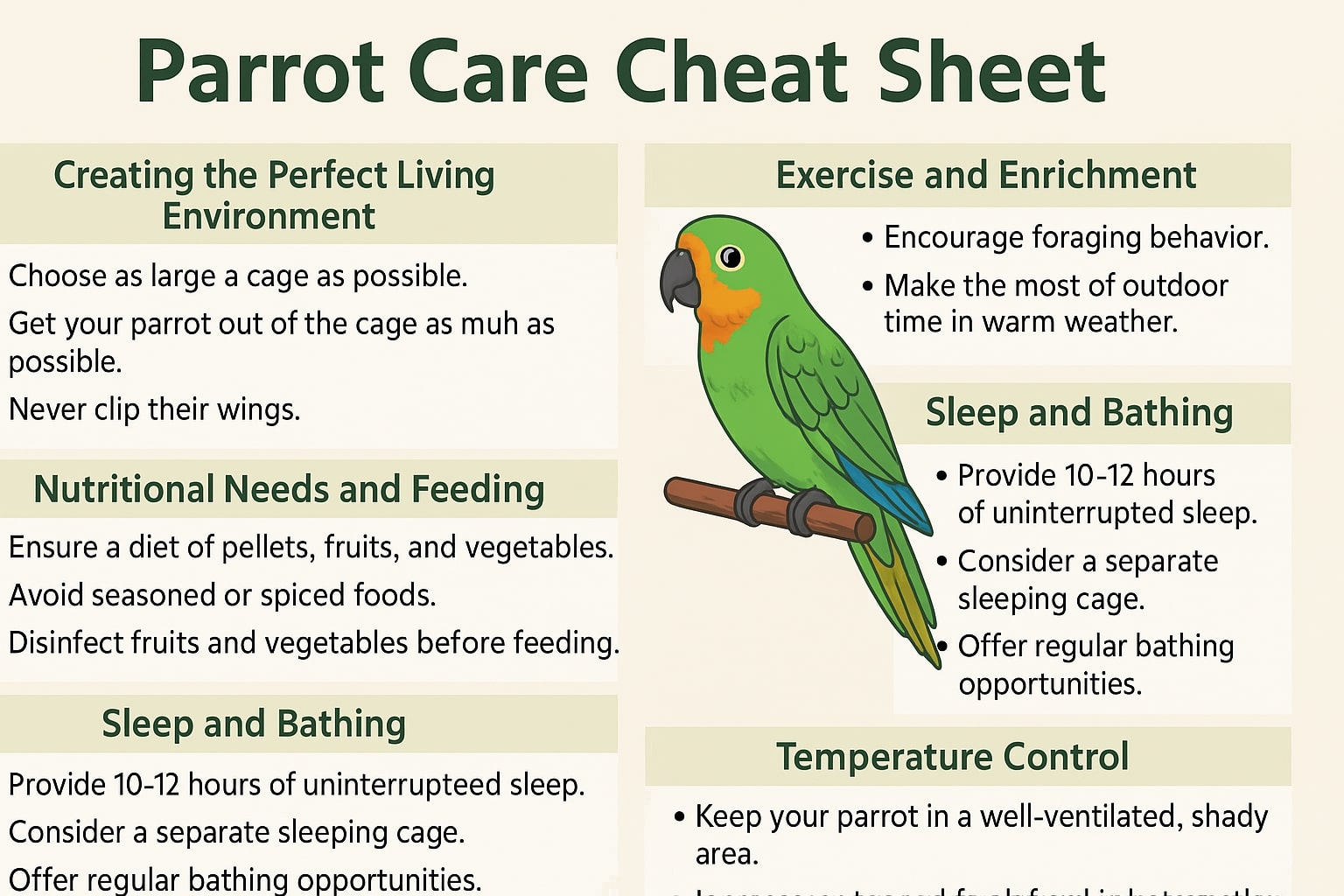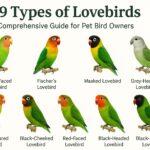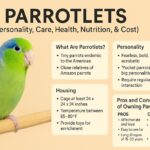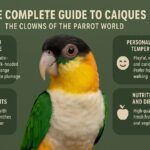Parrots are remarkable creatures that bring joy, companionship, and endless entertainment to countless households around the world. These intelligent birds, with their vibrant colors and impressive ability to mimic human speech, require dedicated care and attention to thrive in captivity. Understanding the specific needs of your parrot is essential for ensuring they live a long, healthy, and fulfilling life as part of your family.
Creating the Perfect Living Environment
Choosing the Right Cage
The foundation of proper parrot care begins with providing an appropriate living space. Your parrot’s cage serves as their primary home, making it crucial to select one that meets their physical and psychological needs.
Make sure that the cage you have for your parrot is as large as possible so that there is plenty of room for toys, and for your parrot to move around1. A spacious cage allows your bird to stretch their wings, exercise, and engage in natural behaviors without feeling confined or stressed.
When selecting a cage, consider the size of your specific parrot species. Larger birds naturally require more space, but even smaller parrots benefit from generous accommodations. The cage should be wide enough for your parrot to fully extend their wings without touching the sides, and tall enough to accommodate multiple perches at different levels. This vertical space is particularly important as parrots naturally prefer to perch at varying heights throughout the day.
The Importance of Out-of-Cage Time
While a proper cage is essential, it should never serve as a permanent prison for your feathered companion. Get your parrot out of the cage as much as possible, encouraging them to fly1. This recommendation highlights a fundamental aspect of parrot care that many owners overlook. Flight is not just exercise for parrots; it’s a basic biological need that contributes to their physical health, mental well-being, and overall quality of life.
Daily out-of-cage time allows your parrot to explore their environment, interact with family members, and engage in natural behaviors that are impossible within the confines of even the largest cage. During these supervised sessions, your parrot can practice flying, which strengthens their wing muscles, improves coordination, and provides essential cardiovascular exercise. This freedom also stimulates their mind and helps prevent the development of behavioral problems often associated with chronic confinement.
Wing Clipping Considerations
The topic of wing clipping remains controversial among parrot owners and avian experts. Never clip their wings, according to some care philosophies that prioritize natural behavior and physical well-being. However, other sources suggest that wing trimming can help prevent injuries from accidental flights, such as collisions with walls, windows, or other pets. The decision regarding wing clipping should be carefully considered based on your specific circumstances, living environment, and the individual needs of your parrot.
If you do choose to have your parrot’s wings trimmed, this procedure should always be performed by a qualified veterinarian or experienced avian professional. Improper wing clipping can cause injury, affect your parrot’s balance, and impact their confidence and mental health.
Remember that flight is crucial for a parrot’s physical and mental well-being, so any decision to limit this ability should be weighed against the potential risks in your specific environment.
Nutritional Needs and Feeding Guidelines
Understanding Parrot Dietary Requirements
Proper nutrition forms the cornerstone of parrot health, yet many owners struggle to provide a diet that meets their bird’s complex nutritional needs. Parrot dietary requirements differ significantly from human diets, making it essential to understand what foods are safe, beneficial, and potentially harmful to your feathered friend.
A balanced parrot diet should consist primarily of high-quality pellets specifically formulated for your bird’s species and size. These pellets provide essential vitamins, minerals, and nutrients in proper proportions. However, pellets alone do not constitute a complete diet.
Fresh fruits and vegetables should make up a significant portion of your parrot’s daily food intake, providing natural vitamins, antioxidants, and variety that keeps meals interesting and nutritious.
Food Safety and Preparation
Food safety takes on special importance when caring for parrots, as these birds are particularly sensitive to contamination and foodborne illnesses. Avoid seasoned or spiced foods, and always allow cooked foods to cool to room temperature before serving.
This precaution prevents burns and ensures that your parrot can safely consume prepared foods without risking injury to their sensitive mouth and digestive system.
When preparing fresh foods for your parrot, ensure meat, fish, and eggs are thoroughly cooked and that frozen food is completely thawed before feeding. Raw or undercooked proteins can harbor dangerous bacteria that may cause serious illness in birds. Additionally, monitor your parrot for diarrhea after meals, which could indicate a problem with food preparation or an adverse reaction to a particular food item.
Cleaning Fruits and Vegetables
Fresh produce requires careful preparation before offering it to your parrot. When offering fruits and vegetables, meticulous cleaning and disinfection are essential. Soak produce in a bowl of water with a small amount of salt or lemon juice for five to ten minutes, then rinse thoroughly with clean water. This process removes pesticides, wax coatings, and potential contaminants that could harm your bird’s sensitive digestive system.
Organic produce, while more expensive, can reduce your parrot’s exposure to harmful chemicals. However, even organic fruits and vegetables should be thoroughly washed before serving. Remove any seeds, pits, or parts that may be toxic to birds, and cut produce into appropriate sizes for your parrot’s beak and eating habits.
Exercise and Mental Stimulation
Encouraging Natural Foraging Behaviors
In the wild, parrots spend a significant portion of their day searching for and obtaining food. This natural behavior provides both physical exercise and mental stimulation that captive birds often lack. Actively encourage foraging behavior by not putting all of their food in the food bowl, but try putting at least fifty percent of their food hidden in puzzles or toys, so that your parrot has to work for their food.
This approach to feeding mimics natural foraging behaviors and provides essential mental enrichment. Hide treats and food items in various locations around the cage, wrap them in paper, or place them inside foraging toys designed specifically for birds. This strategy not only keeps your parrot mentally engaged but also extends feeding time, reducing boredom and preventing the development of destructive behaviors.
The Benefits of Outdoor Time
Weather permitting, outdoor exposure provides numerous benefits for parrot health and well-being. If you have the space, build a small aviary in the garden, so that when the weather is nice your parrot can go outside. Outdoor aviaries allow parrots to experience natural sunlight, fresh air, and environmental enrichment that indoor living cannot replicate.
For those without space for a permanent outdoor aviary, temporary outdoor time can still provide significant benefits. During the summer, make the most of the nice weather by having time outside, as they love to sunbathe, so even if you can’t build an aviary, simply put their cage outdoors when the sun is shining. However, always ensure that your parrot can find a bit of shade if they want to, as overheating can quickly become dangerous.
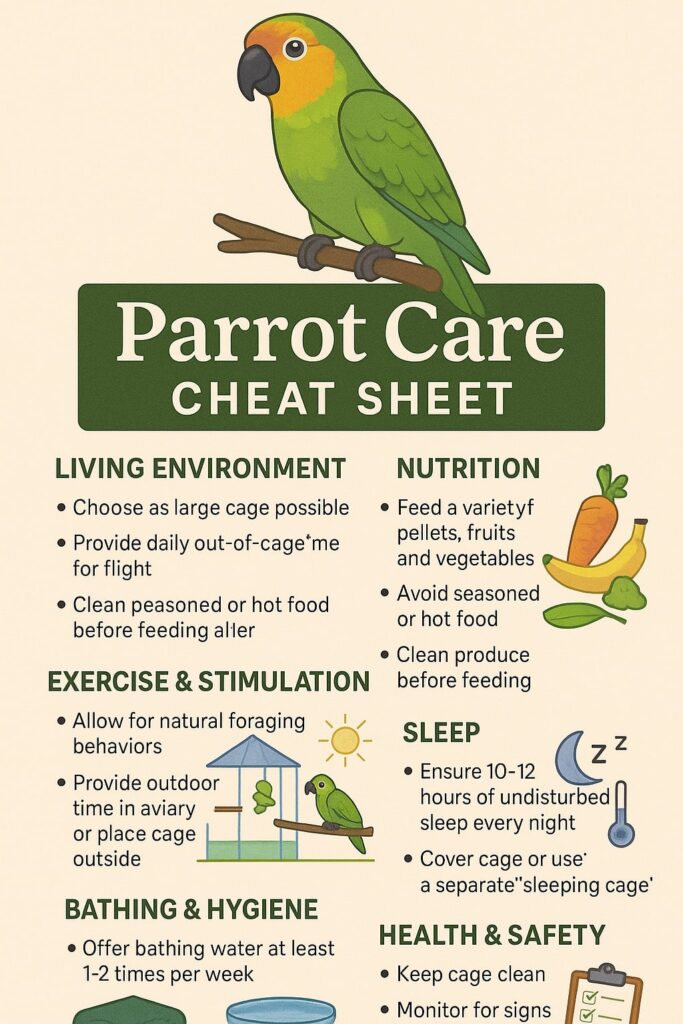
Sleep Requirements and Environment
Creating Optimal Sleep Conditions
Quality sleep is fundamental to parrot health, affecting everything from immune function to behavior and longevity. Ensuring your bird receives adequate, quality sleep is paramount, and this includes providing a tranquil setting with minimal disturbances. Parrots require 10 to 12 hours of uninterrupted sleep each night to maintain optimal health and well-being.
During the summer months, daylight hours are longer, but parrots still need their twelve hours undisturbed sleep a night. This natural sleep requirement remains constant regardless of seasonal changes in daylight duration. Covering over their cage with a blanket helps send them off to sleep and will make sure they’re not disturbed by the early morning sunlight.
Establishing a Sleep Routine
Consider incorporating a small accessory cage, like a travel cage, in a separate, darkened room as a dedicated “sleeping cage”. This approach guarantees your bird experiences an uninterrupted 10 to 12 hours of rest each day, potentially minimizing hormonal behaviors3. The sleeping cage should contain the basics: a perch, water, and perhaps some food for the morning.
Breaking the daily routine by alternating between activities like sleeping, socializing, and feeding helps diminish the perception of the cage as a breeding territory, which can contribute to a more balanced and contented bird. This variation in routine also provides mental stimulation and prevents your parrot from becoming overly attached to territorial behaviors.
Bathing and Hygiene Maintenance
Understanding Bathing Preferences
Regular bathing is essential for maintaining your parrot’s health, skin condition, and feather quality. Birds enjoy keeping clean, so try giving them either a sand bath or a bowl of water to bathe in. Some birds love to have showers, but not too hot. Understanding your bird’s preferred bathing method is key to ensuring their well-being.
Some birds may enjoy bathing in a bowl, while others might relish a shower with their human companions. Experimenting with gentle misting or letting them splash in the sink under a gentle stream of water can help identify their favorite approach. The key is to observe your parrot’s reactions and preferences, then accommodate their individual needs and comfort level.
Bathing Frequency and Technique
Encouraging regular bathing is essential for maintaining your bird’s health, with a general guideline of at least 1 to 2 bathing sessions per week. If your bird particularly enjoys this activity, daily baths can be beneficial. Regular bathing helps maintain healthy skin, keeps feathers in optimal condition, and provides mental stimulation and environmental enrichment.
Water temperature should always be lukewarm, never hot or cold, as parrots are sensitive to temperature extremes. Allow your parrot to control the bathing experience as much as possible, as forced bathing can create stress and negative associations with this important hygiene activity.
Health Monitoring and Environmental Safety
Maintaining a Clean Environment
Parrot droppings and feathers create a breeding ground for bacteria in warm, humid environments. To safeguard both your parrot’s and your family’s health, diligently clean and disinfect the cage, perches, and all surfaces your parrot frequently contacts. If your parrot interacts in human-occupied areas, use protective coverings to prevent contamination from droppings and shed feathers.
Regular cleaning prevents the spread of disease and promotes a healthier living space for both birds and humans. Establish a daily cleaning routine that includes removing soiled food and water, spot-cleaning droppings, and replacing cage liner. Weekly deep cleaning should involve disinfecting perches, toys, and cage bars with bird-safe cleaning products.
Recognizing Health Issues
Preventative care is paramount when it comes to parrot health. Avoid situations where your parrot might ingest unsuitable items, as food poisoning and digestive issues are common parrot ailments, often stemming from the consumption of unclean food or non-edible objects. Careful supervision and a bird-safe environment are crucial for preventing many common health problems.
Watch for signs of illness such as changes in appetite, unusual droppings, lethargy, or changes in vocalization patterns. Early detection of health issues dramatically improves treatment outcomes, making regular observation and veterinary check-ups essential components of responsible parrot ownership.
Environmental Hazards
Many people keep their parrots in the kitchen, but beware; they are very sensitive to smells and noxious gases1. The vapors given off from non-stick saucepans, specifically polytetrafluoroethylene (PTFE), are deadly to birds1. This sensitivity extends to other household hazards including aerosols, cleaning products, candles, and air fresheners.
Creating a bird-safe environment requires awareness of these potential dangers and proactive measures to prevent exposure. Never use non-stick cookware around birds, ensure adequate ventilation when using any chemical products, and be mindful of seemingly innocent items that could pose risks to your parrot’s respiratory system.
Temperature Control and Climate Considerations
Managing Environmental Temperature
Maintaining a comfortable temperature is vital for your parrot’s well-being, as uncomfortable temperatures weaken your parrot’s immune system, increasing susceptibility to illness and potentially leading to death in extreme cases. Monitor the temperature carefully and provide a climate-controlled environment that remains stable throughout the day and night.
Parrots are highly susceptible to heatstroke, so keep your parrot in a well-ventilated, shady area, away from direct sunlight. Avoid placing cages in direct sunlight, and increase fruit and vegetable intake during hot weather. Use water misting to cool the environment if necessary, as temperatures above 35°C (95°F) can cause restlessness, while temperatures above 37°C (98.6°F) can be fatal for some parrots.
Seasonal Considerations
Most birds need ultraviolet light to assist in the manufacture of vitamin D, which helps control calcium levels. If you are unable to put them outside, then get an artificial light source that produces UV light. This need for UV exposure becomes particularly important during winter months when natural sunlight exposure is limited.
Seasonal changes require adjustments to your parrot’s care routine. During colder months, ensure adequate heating without creating drafts, and consider supplemental UV lighting. Summer care involves increased attention to temperature control, hydration, and protection from overheating.
Conclusion
Caring for a parrot requires dedication, knowledge, and ongoing attention to their complex needs. These intelligent, social creatures depend entirely on their human caregivers to provide appropriate housing, nutrition, exercise, and medical care.
By understanding and meeting these requirements, you can enjoy many years of companionship with a healthy, happy parrot that enriches your life as much as you enrich theirs. Remember that each parrot is an individual with unique preferences and needs, so observe your bird carefully and adjust your care routine accordingly. The investment in proper parrot care pays dividends in the form of a strong bond with a remarkable companion that can bring joy and wonder to your daily life for decades to come.
How to Care for a Parrot: A Complete Guide to Keeping Your Feathered Friend Happy and Healthy
Parrots are remarkable creatures that bring joy, companionship, and endless entertainment to countless households around the world. These intelligent birds, with their vibrant colors and impressive ability to mimic human speech, require dedicated care and attention to thrive in captivity. Understanding the specific needs of your parrot is essential for ensuring they live a long, healthy, and fulfilling life as part of your family.
Creating the Perfect Living Environment
Choosing the Right Cage
The foundation of proper parrot care begins with providing an appropriate living space. Your parrot’s cage serves as their primary home, making it crucial to select one that meets their physical and psychological needs.
Make sure that the cage you have for your parrot is as large as possible so that there is plenty of room for toys, and for your parrot to move around1. A spacious cage allows your bird to stretch their wings, exercise, and engage in natural behaviors without feeling confined or stressed.
When selecting a cage, consider the size of your specific parrot species. Larger birds naturally require more space, but even smaller parrots benefit from generous accommodations. The cage should be wide enough for your parrot to fully extend their wings without touching the sides, and tall enough to accommodate multiple perches at different levels. This vertical space is particularly important as parrots naturally prefer to perch at varying heights throughout the day.
The Importance of Out-of-Cage Time
While a proper cage is essential, it should never serve as a permanent prison for your feathered companion. Get your parrot out of the cage as much as possible, encouraging them to fly1. This recommendation highlights a fundamental aspect of parrot care that many owners overlook. Flight is not just exercise for parrots; it’s a basic biological need that contributes to their physical health, mental well-being, and overall quality of life.
Daily out-of-cage time allows your parrot to explore their environment, interact with family members, and engage in natural behaviors that are impossible within the confines of even the largest cage. During these supervised sessions, your parrot can practice flying, which strengthens their wing muscles, improves coordination, and provides essential cardiovascular exercise. This freedom also stimulates their mind and helps prevent the development of behavioral problems often associated with chronic confinement.
Wing Clipping Considerations
The topic of wing clipping remains controversial among parrot owners and avian experts. Never clip their wings, according to some care philosophies that prioritize natural behavior and physical well-being. However, other sources suggest that wing trimming can help prevent injuries from accidental flights, such as collisions with walls, windows, or other pets. The decision regarding wing clipping should be carefully considered based on your specific circumstances, living environment, and the individual needs of your parrot.
If you do choose to have your parrot’s wings trimmed, this procedure should always be performed by a qualified veterinarian or experienced avian professional. Improper wing clipping can cause injury, affect your parrot’s balance, and impact their confidence and mental health.
Remember that flight is crucial for a parrot’s physical and mental well-being, so any decision to limit this ability should be weighed against the potential risks in your specific environment.
Nutritional Needs and Feeding Guidelines
Understanding Parrot Dietary Requirements
Proper nutrition forms the cornerstone of parrot health, yet many owners struggle to provide a diet that meets their bird’s complex nutritional needs. Parrot dietary requirements differ significantly from human diets, making it essential to understand what foods are safe, beneficial, and potentially harmful to your feathered friend.
A balanced parrot diet should consist primarily of high-quality pellets specifically formulated for your bird’s species and size. These pellets provide essential vitamins, minerals, and nutrients in proper proportions. However, pellets alone do not constitute a complete diet.
Fresh fruits and vegetables should make up a significant portion of your parrot’s daily food intake, providing natural vitamins, antioxidants, and variety that keeps meals interesting and nutritious.
Food Safety and Preparation
Food safety takes on special importance when caring for parrots, as these birds are particularly sensitive to contamination and foodborne illnesses. Avoid seasoned or spiced foods, and always allow cooked foods to cool to room temperature before serving.
This precaution prevents burns and ensures that your parrot can safely consume prepared foods without risking injury to their sensitive mouth and digestive system.
When preparing fresh foods for your parrot, ensure meat, fish, and eggs are thoroughly cooked and that frozen food is completely thawed before feeding. Raw or undercooked proteins can harbor dangerous bacteria that may cause serious illness in birds. Additionally, monitor your parrot for diarrhea after meals, which could indicate a problem with food preparation or an adverse reaction to a particular food item.
Cleaning Fruits and Vegetables
Fresh produce requires careful preparation before offering it to your parrot. When offering fruits and vegetables, meticulous cleaning and disinfection are essential. Soak produce in a bowl of water with a small amount of salt or lemon juice for five to ten minutes, then rinse thoroughly with clean water. This process removes pesticides, wax coatings, and potential contaminants that could harm your bird’s sensitive digestive system.
Organic produce, while more expensive, can reduce your parrot’s exposure to harmful chemicals. However, even organic fruits and vegetables should be thoroughly washed before serving. Remove any seeds, pits, or parts that may be toxic to birds, and cut produce into appropriate sizes for your parrot’s beak and eating habits.
Exercise and Mental Stimulation
Encouraging Natural Foraging Behaviors
In the wild, parrots spend a significant portion of their day searching for and obtaining food. This natural behavior provides both physical exercise and mental stimulation that captive birds often lack. Actively encourage foraging behavior by not putting all of their food in the food bowl, but try putting at least fifty percent of their food hidden in puzzles or toys, so that your parrot has to work for their food.
This approach to feeding mimics natural foraging behaviors and provides essential mental enrichment. Hide treats and food items in various locations around the cage, wrap them in paper, or place them inside foraging toys designed specifically for birds. This strategy not only keeps your parrot mentally engaged but also extends feeding time, reducing boredom and preventing the development of destructive behaviors.
The Benefits of Outdoor Time
Weather permitting, outdoor exposure provides numerous benefits for parrot health and well-being. If you have the space, build a small aviary in the garden, so that when the weather is nice your parrot can go outside. Outdoor aviaries allow parrots to experience natural sunlight, fresh air, and environmental enrichment that indoor living cannot replicate.
For those without space for a permanent outdoor aviary, temporary outdoor time can still provide significant benefits. During the summer, make the most of the nice weather by having time outside, as they love to sunbathe, so even if you can’t build an aviary, simply put their cage outdoors when the sun is shining. However, always ensure that your parrot can find a bit of shade if they want to, as overheating can quickly become dangerous.
Sleep Requirements and Environment
Creating Optimal Sleep Conditions
Quality sleep is fundamental to parrot health, affecting everything from immune function to behavior and longevity. Ensuring your bird receives adequate, quality sleep is paramount, and this includes providing a tranquil setting with minimal disturbances. Parrots require 10 to 12 hours of uninterrupted sleep each night to maintain optimal health and well-being.
During the summer months, daylight hours are longer, but parrots still need their twelve hours undisturbed sleep a night. This natural sleep requirement remains constant regardless of seasonal changes in daylight duration. Covering over their cage with a blanket helps send them off to sleep and will make sure they’re not disturbed by the early morning sunlight.
Establishing a Sleep Routine
Consider incorporating a small accessory cage, like a travel cage, in a separate, darkened room as a dedicated “sleeping cage”. This approach guarantees your bird experiences an uninterrupted 10 to 12 hours of rest each day, potentially minimizing hormonal behaviors3. The sleeping cage should contain the basics: a perch, water, and perhaps some food for the morning.
Breaking the daily routine by alternating between activities like sleeping, socializing, and feeding helps diminish the perception of the cage as a breeding territory, which can contribute to a more balanced and contented bird. This variation in routine also provides mental stimulation and prevents your parrot from becoming overly attached to territorial behaviors.
Bathing and Hygiene Maintenance
Understanding Bathing Preferences
Regular bathing is essential for maintaining your parrot’s health, skin condition, and feather quality. Birds enjoy keeping clean, so try giving them either a sand bath or a bowl of water to bathe in. Some birds love to have showers, but not too hot. Understanding your bird’s preferred bathing method is key to ensuring their well-being.
Some birds may enjoy bathing in a bowl, while others might relish a shower with their human companions. Experimenting with gentle misting or letting them splash in the sink under a gentle stream of water can help identify their favorite approach. The key is to observe your parrot’s reactions and preferences, then accommodate their individual needs and comfort level.
Bathing Frequency and Technique
Encouraging regular bathing is essential for maintaining your bird’s health, with a general guideline of at least 1 to 2 bathing sessions per week. If your bird particularly enjoys this activity, daily baths can be beneficial. Regular bathing helps maintain healthy skin, keeps feathers in optimal condition, and provides mental stimulation and environmental enrichment.
Water temperature should always be lukewarm, never hot or cold, as parrots are sensitive to temperature extremes. Allow your parrot to control the bathing experience as much as possible, as forced bathing can create stress and negative associations with this important hygiene activity.
Health Monitoring and Environmental Safety
Maintaining a Clean Environment
Parrot droppings and feathers create a breeding ground for bacteria in warm, humid environments. To safeguard both your parrot’s and your family’s health, diligently clean and disinfect the cage, perches, and all surfaces your parrot frequently contacts. If your parrot interacts in human-occupied areas, use protective coverings to prevent contamination from droppings and shed feathers.
Regular cleaning prevents the spread of disease and promotes a healthier living space for both birds and humans. Establish a daily cleaning routine that includes removing soiled food and water, spot-cleaning droppings, and replacing cage liner. Weekly deep cleaning should involve disinfecting perches, toys, and cage bars with bird-safe cleaning products.
Recognizing Health Issues
Preventative care is paramount when it comes to parrot health. Avoid situations where your parrot might ingest unsuitable items, as food poisoning and digestive issues are common parrot ailments, often stemming from the consumption of unclean food or non-edible objects. Careful supervision and a bird-safe environment are crucial for preventing many common health problems.
Watch for signs of illness such as changes in appetite, unusual droppings, lethargy, or changes in vocalization patterns. Early detection of health issues dramatically improves treatment outcomes, making regular observation and veterinary check-ups essential components of responsible parrot ownership.
Environmental Hazards
Many people keep their parrots in the kitchen, but beware; they are very sensitive to smells and noxious gases1. The vapors given off from non-stick saucepans, specifically polytetrafluoroethylene (PTFE), are deadly to birds1. This sensitivity extends to other household hazards including aerosols, cleaning products, candles, and air fresheners.
Creating a bird-safe environment requires awareness of these potential dangers and proactive measures to prevent exposure. Never use non-stick cookware around birds, ensure adequate ventilation when using any chemical products, and be mindful of seemingly innocent items that could pose risks to your parrot’s respiratory system.
Temperature Control and Climate Considerations
Managing Environmental Temperature
Maintaining a comfortable temperature is vital for your parrot’s well-being, as uncomfortable temperatures weaken your parrot’s immune system, increasing susceptibility to illness and potentially leading to death in extreme cases. Monitor the temperature carefully and provide a climate-controlled environment that remains stable throughout the day and night.
Parrots are highly susceptible to heatstroke, so keep your parrot in a well-ventilated, shady area, away from direct sunlight. Avoid placing cages in direct sunlight, and increase fruit and vegetable intake during hot weather. Use water misting to cool the environment if necessary, as temperatures above 35°C (95°F) can cause restlessness, while temperatures above 37°C (98.6°F) can be fatal for some parrots.
Seasonal Considerations
Most birds need ultraviolet light to assist in the manufacture of vitamin D, which helps control calcium levels. If you are unable to put them outside, then get an artificial light source that produces UV light. This need for UV exposure becomes particularly important during winter months when natural sunlight exposure is limited.
Seasonal changes require adjustments to your parrot’s care routine. During colder months, ensure adequate heating without creating drafts, and consider supplemental UV lighting. Summer care involves increased attention to temperature control, hydration, and protection from overheating.
Conclusion
Caring for a parrot requires dedication, knowledge, and ongoing attention to their complex needs. These intelligent, social creatures depend entirely on their human caregivers to provide appropriate housing, nutrition, exercise, and medical care.
By understanding and meeting these requirements, you can enjoy many years of companionship with a healthy, happy parrot that enriches your life as much as you enrich theirs. Remember that each parrot is an individual with unique preferences and needs, so observe your bird carefully and adjust your care routine accordingly. The investment in proper parrot care pays dividends in the form of a strong bond with a remarkable companion that can bring joy and wonder to your daily life for decades to come.
- Parrotlets (Personality, Care, Health, Nutrition, & Cost) - June 20, 2025
- Caique (Personality, Care, Health, & Nutrition) - June 20, 2025
- The Complete Guide to Golden Retrievers - June 9, 2025
